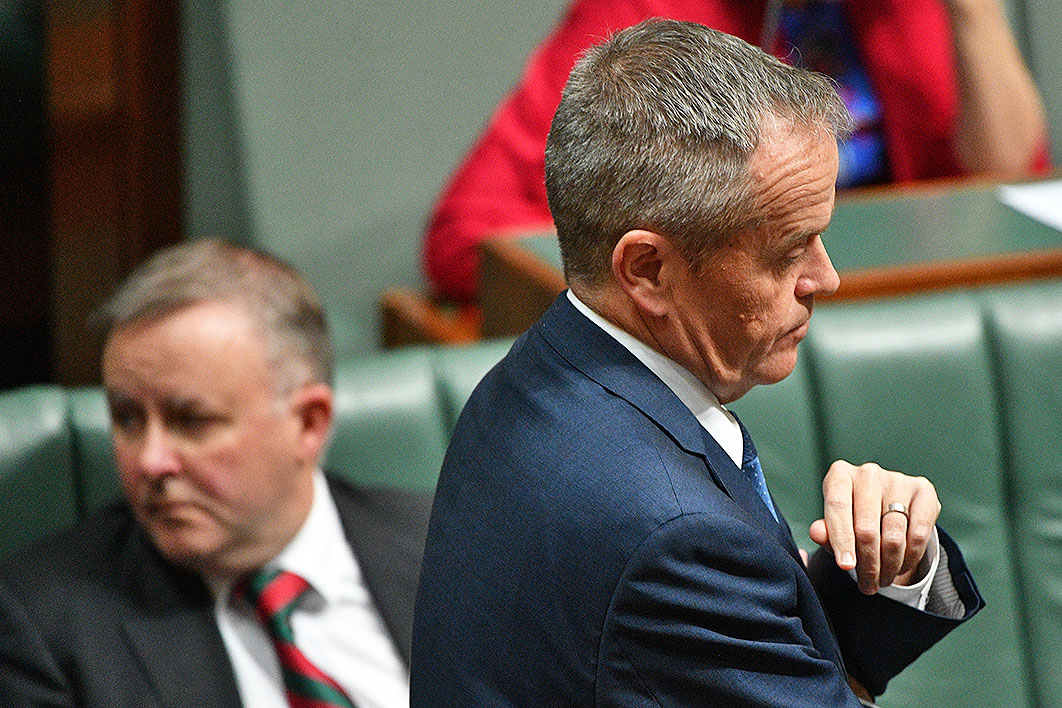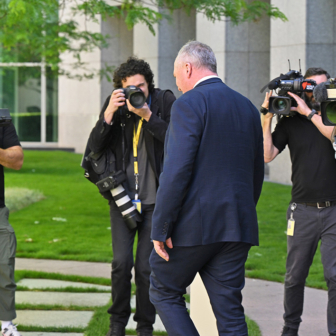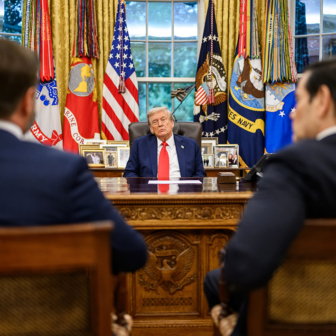Bill Shorten just made his worst mistake since he became opposition leader. Without consulting his shadow cabinet or party room, he has committed Labor to a policy which it cannot deliver — and which will cost it crucial support both in next month’s by-elections, and in the coming federal election, whenever that’s held.
Sure, when Shorten told the world yesterday that Labor in government would move to repeal the recent measures cutting the company tax rate to 25 per cent for businesses with turnover of between $50 million and $10 million a year — and possibly even down to $2 million a year — he was not stating new Labor policy. Labor opposed the tax cuts when they were passed in the Senate, and had not set out a new policy position since.
But trying to repeal a tax cut that has already become law is a different matter from opposing it in the first place. Then, Labor was opposing a bill to give small and medium businesses a benefit they did not have. Now, it is proposing a bill to take that benefit away from businesses that already have it.
The biggest flaw in Shorten’s position is not even the fact that it would affect small and medium businesses, for which the media and the government are now flaying him. The real problem is he will not be able to get his tax increase through the Senate — so Labor is exposing itself to a public flogging from here to election day for a policy it will be unable to deliver.
Moreover, if Labor counts the anticipated revenue from its tax rise to pay for its spending commitments, then its election costings will not be credible. This will be a zombie tax rise. And while the Coalition has been able to implement some of its zombie spending cuts simply by freezing spending on things it doesn’t like, such as universities, there is no back door a Labor government could use to get around the Senate’s opposition to tax rises.
What on earth was Shorten thinking when he made this “captain’s call”? It offers no gain, and a lot of pain. It could cost him the election.
As one of Napoleon’s aides remarked after his leader used flimsy evidence to order the execution of the Duc D’Enghien, “It’s worse than a crime. It’s a blunder.”
It wasn’t Shorten’s first misstep this week. Labor’s new ads implying that Malcolm Turnbull is supporting company tax cuts to line his own wallet may leave some mud that yields political benefit, but at some damage to Labor’s own integrity and to the level of Australian political debate.
It’s a ludicrous argument. Turnbull is already a zillionaire; money is not what he needs. What he needs are our votes, and he has defined himself as a tax cutter because he thinks that will make us more likely to vote for him. He’s also looking after the corporate interests that finance the Liberal Party. Turnbull may be an aristocrat in nature, but it’s ridiculous to imply that he’s a kleptocrat.
Shorten himself has been the object of equally offensive and untrue insinuations by the Liberals and their media allies, but that is no excuse for getting down in the gutter with them.
Nor is there any real excuse, on such an important policy issue, for Shorten to be making policy on the run, like Tony Abbott or Julia Gillard, without consulting the shadow cabinet or caucus. One of his great strengths as leader until now has been his self-discipline, and respect for process.
Yes, when the government is planning another attempt to get its proposed company tax cuts through the Senate, it’s natural for the media to ask Shorten what he will do about the tax cuts that are already L-A-W. He might have felt nettled on Tuesday morning after the Financial Review’s bureau chief Phillip Coorey confirmed with Senate crossbenchers that they would block any attempt by Labor in government to take back the tax cuts that are now law.
But politics is a nettling occupation, and Shorten always appeared to be rather good at putting up with its stings. He only had to do what his shadow treasurer Chris Bowen does every other day, and play a dead bat, telling the world that Labor’s position on this matter is being carefully worked through, and its policy will be released before the election.
Was it that Shorten had become unhinged by the now-famous Whitlam Oration last Friday night by shadow infrastructure minister Anthony Albanese, in which his main leadership rival clearly did put out a partial political manifesto which, while praising Shorten effusively in places, nonetheless set out an approach to government that is clearly at odds with the style of his current boss.
It might have been the Whitlam Oration, but Albanese’s approach echoed Bob Hawke’s 1983 campaign slogan “Bringing Australia Together.” He argued that Labor should try to enlist the support of business through “collaboration and compromise” and went on: “Our job is not to sow discord. It is to bring people together in the service of the national interest. Labor doesn’t have to agree with business on issues such as company tax rates, but we do have to engage constructively with business large and small.”
Albanese also advocated party reform to give more power to branches — definitely not a Shorten priority — and went out of his way to praise a Liberal party icon, former NSW party secretary and Fraser government minister Sir John Carrick, who died recently at the age of ninety-nine. Carrick was a wartime mate and lifelong friend of Albo’s mentor Tom Uren. And Uren himself was a Whitlam and Hawke government minister who came from Labor’s left — yet made it his priority to find common ground with conservative state governments so they could get things done. He was one of Whitlam’s more successful and effective ministers.
Albanese made no direct criticism of Shorten, but rather seemed to be offering a different model of leadership. You would have thought Labor has had enough of changing leaders shortly before elections, but you don’t have to be a conspiracy theorist to read Albanese’s speech as a job application.
If so, it may explain why Shorten appears to have become so rattled. He would be sensible to front the media again, eat humble pie, and wave away his words on Tuesday as simply stating Labor’s current policy, and not as one that it will be taking to the election.
As I pointed out last month, there is little chance that the next Senate will agree to repeal the tax cuts it voted on just a year earlier. If anything, there could be even fewer Labor and Green senators in the next parliament than in this one. A smart Labor leader would accept that, cut his losses, and reshape his priorities to promise the voters only things he will be able to deliver.
To continue on this course would be to destroy Labor’s fiscal credibility. It won’t get that measure through the Senate. Therefore it won’t have the money it had assumed from it, and it won’t be able to spend it, however noble the intended cause. It lost that battle, so it has to go back to the drawing board and work out what to do next.
If Shorten won’t do that, Labor MPs might look for a leader who will.
The question of what the right rate for company tax is, and what size of business should pay what rate, is entirely subjective. It essentially comes down to weighing up the balance between the government’s desire to stimulate new investment and its need for revenue.
Taxes are a necessary evil. Virtually any tax cut, in itself, stimulates more economic activity. Those who suddenly pay less tax have more money to spend, and even if they save some of it at first, they will spend it some day. That’s as true for companies as it is for you or me.
Proof of that comes from a valuable exercise by Alpha Beta, the consultancy founded by economist Andrew Charlton after his previous life as Kevin Rudd’s adviser through the global financial crisis. With the help of accounting software firm Zero, his firm looked at what 70,000 businesses with turnover just under $2 million a year had done with the money they saved from the first wave of company tax cuts in 2015.
Charlton found that 27 per cent of the firms that benefited used most of their gains to increase investment, 19 per cent used it to hire more workers, 3 per used gave their workers pay rises, and 51 per cent put it in the bank. (In time, of course, that money in the bank will probably be spent too.) He described the net impact as “a small effect on employment and investment and an insignificant effect on wages.”
That was a very small tax cut. A bigger tax cut, in itself, would have a bigger impact on stimulating investment, employment and wages. If you abolished all taxes completely, you could assume a bigger impact still.
But taxes are necessary. They finance all the things that government does: providing free education at schools, providing free care at doctors’ surgeries and hospitals, protecting us with defence forces and police, building and operating our roads and railways, providing pensioners, the poor, the sick and the unemployed with most of their income, and doing the thousand other things that governments do to relieve us of costs or provide us with things that make our lives better (such as the ABC).
And those things also have an economic impact. The higher taxes in the world, by and large, are imposed in the richest countries: especially in Western Europe, but also in the United States, Canada, New Zealand, Japan and here. It is the free public goods provided by our education, infrastructure, health care, defence and a trustworthy legal and regulatory system that make it possible for businesses to operate at high levels of productivity. Go visit the developing world if you want to see how low-tax countries operate.
The theory promoted by the Business Council and its media allies that company tax cuts are the only way we can stimulate the economy is bunk. Better transport infrastructure that saves us time and money stimulates growth. So does better education etcetera.
The core of the intellectual argument between the Coalition and Labor on company tax is where to draw the line between these two goals. The Coalition says its budget projections show that the revenues flowing from higher future growth in employment, investment, wages and profits means it can pay for its proposed company tax cuts, the income tax cuts passed by the Senate last week, and all the other spending we will need, and still run up small but consistent budget surpluses through the coming decade.
Labor — joined on this by some budget-watchers — disputes that, on several grounds. The government’s growth assumptions appear optimistic, especially on wage growth. Some of its spending assumptions are unrealistic, unfair or unaffordable: for example, Anthony Albanese argued last Friday night that the forward estimates would see Commonwealth investment in infrastructure halved over the next decade, to just 0.2 per cent of gross domestic product.
Some of us have watched with gritted teeth as first Labor, then the Coalition, have made phony promises to the voters that they will bring the budget back into surplus. Ten years after the global financial crisis (which we supposedly escaped), next year’s budget is still expected to run up a deficit of $14.5 billion. Yet the government is now demanding that parliament commit to income and company tax cuts some years away when it has still not got the government back into surplus!
There is also the argument, put most powerfully by Victoria University economist Janine Dixon, that Australia’s almost unique system of dividend imputation means Australian shareholders would receive little benefit from the tax cuts because lower company tax would mean lower imputation credits. Dr Dixon argues that the benefits of lower taxes would go overwhelmingly to foreign investors, whose share of the tax burden would fall, with Australian residents picking up the tab. The growth in jobs and wages generated by the tax cuts would not be enough to offset that.
There is little evidence that the company tax rate has any significant impact on business decisions on where to invest, unless the differences are very large. But there is no doubt that globally, governments are engaged in a tax “race to the bottom,” with the US corporate tax rate cut last year to 21 per cent and rates being progressively lowered in Britain, Singapore and other countries. There is a risk that Australia’s 30 per cent rate could become a disincentive to foreign investment in future.
That is why the International Monetary Fund and Reserve Bank governor Philip Lowe have suggested that Australia should lower corporate tax rates as part of a comprehensive tax reform package designed to be revenue-neutral, rather than as a standalone measure that could jeopardise fragile budget surpluses. For political reasons, the government has rejected their advice — and so has Labor. That’s a shame, because it was good advice. •




